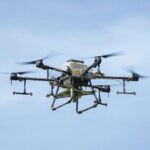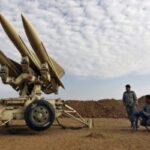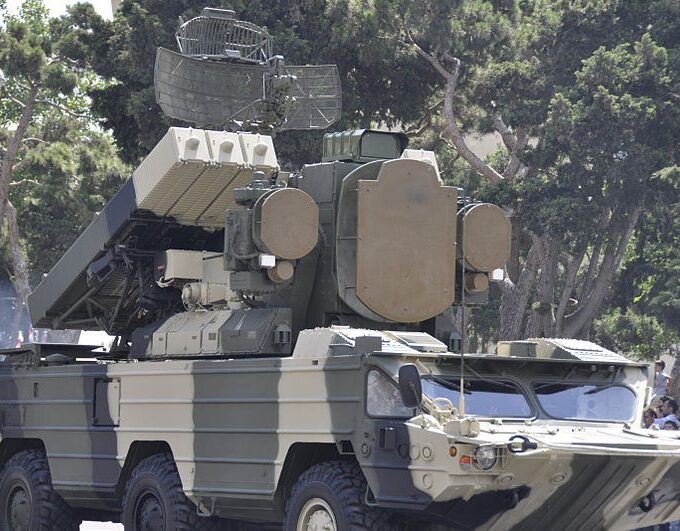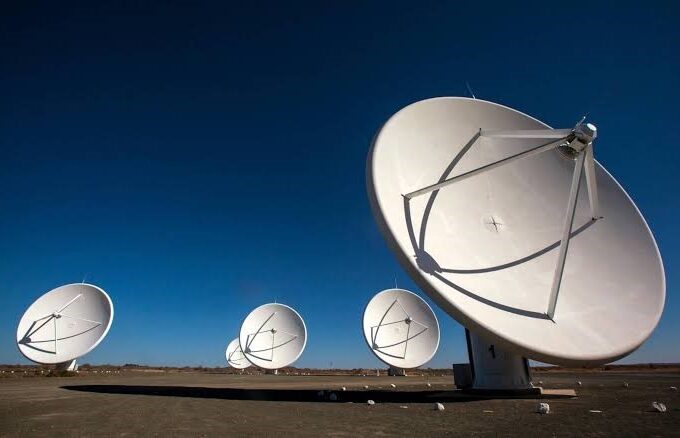Military Satellites and Space Ambitions: Africa’s Quiet Race to the Stars
This article explores the growing role of space-based assets in Africa’s defence strategies, the countries leading the charge, and whether the continent’s fragmented efforts can converge into a viable, home-grown military space capability.

Beyond the battles on land, air, and sea, a new theatre of competition is quietly emerging across the African continent—space. From high-resolution satellite surveillance to secure military communications and early warning systems, African nations are beginning to realise that the next frontier of defence supremacy lies in orbit. While still in its infancy compared to the United States, Russia, China, or even India, Africa’s military space ambitions are gaining altitude, driven by regional security concerns, technological advancement, and the increasing importance of geospatial intelligence in modern warfare.
This article explores the growing role of space-based assets in Africa’s defence strategies, the countries leading the charge, and whether the continent’s fragmented efforts can converge into a viable, home-grown military space capability.
Why Space Matters to African Security
In an era of asymmetric threats, Africa’s defence establishments are learning that what happens in orbit shapes what happens on the ground. Satellites provide critical capabilities such as:
• Real-time intelligence, surveillance, and reconnaissance (ISR) over remote or hostile terrain
• Encrypted military communications for secure, theatre-wide coordination
• Early warning for missile threats or hostile aerial incursions
• Navigation and precision timing for unmanned aerial vehicles (UAVs) and strike platforms
• Disaster response and border surveillance, especially in regions vulnerable to insurgency and displacement
According to the African Union’s Agenda 2063, space technology is a “critical infrastructure for peace and security.” In practice, this means building capabilities that allow African militaries to see, decide, and act faster and smarter in contested environments.
The Continental Leaders: Egypt, Nigeria, Algeria, and South Africa
Only a handful of African countries currently possess dedicated satellite programmes with potential or actual military applications. At the forefront are Egypt, Nigeria, Algeria, and South Africa—each pursuing unique national strategies but with overlapping security interests.
Egypt: The Strategic Sky Watcher
Egypt is arguably Africa’s most advanced space power.
• Operates multiple satellites including EgyptSat-A, launched in 2019, which delivers high-resolution (1 metre) optical imagery—useful for monitoring troop movements, infrastructure, and border activity.
• The Egyptian Space Agency (EgSA) works closely with the military and has an explicit dual-use mission structure, combining civil and defence needs.
• Egypt’s ground control facilities allow for secure image processing and encrypted communications.
• As part of its broader military doctrine, Egypt integrates satellite imagery with airstrike planning and Sinai counterterrorism operations.
With strong partnerships with Russia and China, Egypt plans to expand into synthetic aperture radar (SAR) capabilities for all-weather, night-time surveillance—a significant leap in strategic ISR capacity.
Nigeria: West Africa’s Orbital Aspirant
Nigeria’s space ambitions are driven by both developmental and security concerns.
• The NigeriaSat series, including NigeriaSat-2, offers multi-spectral imagery useful for monitoring the Boko Haram theatre in the northeast and border surveillance across the Sahel.
• Nigerian Communications Satellite (NigComSat-1R) enhances encrypted military communications—critical for real-time command and control in counterinsurgency operations.
• The National Space Research and Development Agency (NASRDA) supports defence cooperation, though its integration with Nigeria’s armed forces is still evolving.
In 2023, Nigeria’s Ministry of Defence signed a framework to leverage satellite assets for real-time UAV and airstrike coordination, indicating the country’s intention to fuse space assets with tactical battlefield operations.
Algeria: Quiet and Strategic
Algeria maintains a classified military space programme with significant Russian collaboration.
• AlSat-2B, launched in 2016, provides panchromatic and multispectral imagery at 2.5-metre resolution.
• Emphasis is placed on border control, especially along the Libyan and Malian frontiers.
• Algeria is building sovereign ground infrastructure and has explored options for military-grade satellites through China’s DFH program.
With a doctrine shaped by its historical rivalry with Morocco and regional instability, Algeria uses space assets to augment its multi-layered air defence network and early warning architecture.
South Africa: Technological Pioneer, Strategic Laggard?
South Africa’s Council for Scientific and Industrial Research (CSIR) and Denel Spaceteq have long developed small satellites with advanced payloads, including the SumbandilaSat.
• South Africa is a continental leader in space engineering, optical payloads, and electronic warfare technology, but lags behind in large-scale military satellite integration.
• Defence applications of space technologies exist mostly in signal intelligence, navigation, and weather monitoring, but not yet in a formal military constellation.
South Africa’s challenge remains political prioritisation—its space assets are advanced but underfunded, and defence-sector uptake remains uneven.
The Regional Landscape: Patchwork Progress
Elsewhere on the continent, progress is more sporadic:
• Angola launched AngoSat-2 in 2022 (after AngoSat-1 failed in orbit). Though primarily a communications satellite, it has military applications in encrypted C4ISR.
• Ethiopia, with support from China, has launched two observation satellites and aspires to develop space assets to monitor the Grand Renaissance Dam and regional threats.
• Ghana, Kenya, and Rwanda have launched CubeSats for Earth observation, potentially upgradable for tactical ISR in partnership with international donors.
The African Union’s African Space Policy and Strategy, adopted in 2016, encourages collective development of regional space assets, but implementation remains uneven due to funding gaps and sovereignty concerns.
Challenges: Big Ambitions, Limited Launchpads
Africa’s military satellite race faces steep hurdles:
1. Lack of sovereign launch capacity: Only South Africa and Egypt have partial orbital infrastructure. Most launches depend on foreign rockets, creating dependency.
2. Funding constraints: Satellite programmes, especially those involving electro-optical or radar payloads, can cost between $50 million and $300 million per satellite, excluding ground stations and launch fees.
3. Fragmented national strategies: Without regional alignment, most countries duplicate efforts, fail to share data, or lack the critical mass to build effective constellations.
4. Cybersecurity risks: Satellite command systems, ground stations, and communications links remain vulnerable to hacking and espionage.
5. Export control and technology denial regimes: Western and Eastern powers tightly regulate high-resolution satellite components, slowing down indigenous African capabilities.
The Role of Partnerships: China, Russia, Turkey, and the West
Much of Africa’s satellite progress relies on international partnerships:
• China supports satellite development and ground station construction in Nigeria, Algeria, Ethiopia, and Sudan, often on concessional terms.
• Russia provides launch services and platform technology, especially for Algeria and Egypt.
• Turkey is emerging as a space partner, especially in dual-use UAV–satellite coordination.
• The U.S. and EU focus more on data-sharing and remote sensing via donor programmes rather than building sovereign African constellations.
While these partnerships fill capacity gaps, they risk creating strategic dependencies and uneven technological sovereignty.
Toward an African Space Defence Framework?
The African Union Commission, through the African Space Agency (based in Cairo), is promoting the idea of a continental satellite system for defence, disaster management, and surveillance. Key proposals include:
• A shared satellite constellation operated by multiple countries with encrypted data access layers.
• Creation of regional imagery fusion centres to monitor border movements, maritime zones, and terrorist hotspots.
• Development of standardised orbital slots and data-sharing agreements for interoperability.
The goal is to move from country-level pilots to a coordinated space architecture—but progress remains slow, and national interests often override multilateral ambitions.
Conclusion: Africa’s Space Awakening
Africa’s quiet race to the stars is no longer just about development—it is about defence. As satellites become the eyes and ears of the modern battlefield, African militaries are learning that space-based assets are no longer a luxury but a necessity.
From Egypt’s high-resolution reconnaissance to Nigeria’s encrypted battlefield communications and Algeria’s orbital surveillance of contested borders, a new strategic era is dawning. While a fully integrated continental space defence framework remains aspirational, the trajectory is clear: the next battles may begin in orbit long before they reach the ground.
Africa’s skies are rising. The question now is whether the continent can translate ambition into infrastructure, and potential into power.
Africa’s Military Space Snapshot (2023–2024):
• 14 African countries have launched satellites (mostly Earth observation)
• 6 African countries operate satellites with defence applications
• Estimated cost of dual-use high-resolution satellite: $130–200 million
• EgyptSat-A resolution: 1 metre (optical)
• Nigeria’s satellite coverage area: +500,000 sq km per satellite swath
• AU’s African Space Agency headquarters operational since 2023 (Cairo)
• Less than 5% of African defence budgets allocated to space-related tech
Recent Posts
Categories
- Air & Aerospace17
- Border Security15
- Civil Security6
- Civil Wars4
- Crisis5
- Cyber Security8
- Defense24
- Diplomacy19
- Entrepreneurship1
- Events5
- Global Security Watch6
- Industry8
- Land & Army9
- Leadership & Training5
- Military Aviation7
- Military History27
- Military Speeches1
- More1
- Naval & Maritime9
- Policies1
- Resources2
- Security12
- Special Forces2
- Systems And Technology9
- Tech6
- Uncategorized6
- UNSC1
- Veterans7
- Women in Defence9
Related Articles
THE DAWN OF VIGILANT SKIES: AFRICA’S EMERGING AIRBORNE EARLY WARNING CAPABILITIES
Africa’s airspace is undergoing a strategic transformation as a growing number of...
ByKing Richard Igimoh, Group Editor ALOJanuary 15, 2026AIR & AEROSPACE – AIR DEFENCE SYSTEMS IN AFRICA: AN UNFINISHED BUSINESS
By December 2025, Africa’s air defence picture remains uneven, shaped by rising...
ByKing Richard Igimoh, Group Editor ALODecember 24, 2025AFRICAN AIR FORCES RISE TO THE FOREFRONT IN COUNTERTERRORISM OPERATIONS
Across the vast and volatile regions of Africa, air forces once limited...
ByKing Richard Igimoh, Group Editor ALONovember 21, 2025THE SPACE RACE: AFRICA’S EMERGING AEROSPACE PROGRAMMES
Africa’s skies are no longer just a backdrop to other powers’ ambitions...
ByKing Richard Igimoh, Group Editor ALOOctober 6, 2025












